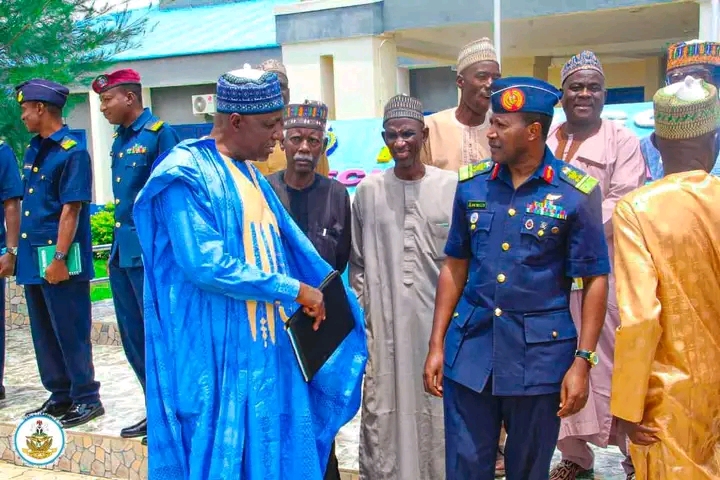By Abdul Lauya
In a symbolic and impactful move, the Nigerian Air Force (NAF), under the leadership of the Chief of the Air Staff (CAS), Air Marshal Hasan Bala Abubakar, on 5 July 2025, organized a nationwide Veterans’ Parley across all its Commands and units.
The event marked a significant milestone in reconnecting with retired personnel, honouring their sacrifices, and reigniting hope for more structured support, particularly in areas of pensions, healthcare, and post-service welfare.
The initiative, tagged Chief of the Air Staff Veterans’ Parley, was emotional and well-received, bringing together hundreds of retired officers and airmen who shared heartfelt reflections on their years of service and the struggles they face in retirement.
For many, it was more than a reunion, it was a powerful signal that their contributions are remembered and that their welfare still matters.
Air Marshal Abubakar, in a nationwide address, described the parley as “a national call to remembrance, reflection, and reconnection.”
He reaffirmed the NAF’s commitment to ensuring that veterans are not sidelined, pledging to improve healthcare access, streamline pension processes, and foster an inclusive post-service support structure. “This is your home, and your voice will always count,” he declared.
From Kaduna to Calabar, Port Harcourt to Kano, retired airmen were warmly received by serving personnel in what many described as a long-overdue gesture of institutional solidarity.
Retired Master Warrant Officer Apreala Edmund said, “We never asked for thanks, but today, we feel seen.” Another veteran noted, “It’s a reminder that we are not forgotten.”
The parley also comes at a pivotal moment for the veterans’ community, as the Military Pensions Board (MPB) has just appointed a new Chairman, Air Vice Marshal Abubakar Adamu, a respected financial expert with a reputation for professionalism and integrity.
Although he is yet to unveil his official roadmap, his appointment has already stirred optimism among retirees, who see in him the potential for long-needed reforms. Many believe that with his financial expertise and deep understanding of military structure, the MPB could be repositioned to address longstanding challenges such as delayed pensions payment, inefficient verification systems, and lack of responsive support.
The alignment between the NAF’s veterans-first engagement strategy and fresh leadership at the MPB offers a rare window for transformation in military pension and welfare administration.
Observers have hailed the NAF’s initiative as a blueprint for broader military reform, urging the Nigerian Army and Navy to either adopt or strengthen similar platforms to engage with their retired personnel. Beyond appreciation, regular dialogue with veterans can inform institutional policies, close trust gaps, and restore dignity to military retirement.
Without a doubt, the NAF Veterans Parley has rekindled hope across the military veterans’ community, especially those grappling with welfare uncertainties. It underscores a growing recognition within the Armed Forces that the duty of care must extend beyond active service.
In reaffirming the bond between the institution and its retirees, the NAF is not only honouring its past, it is helping to secure a more just and humane future for those who served.
For advert placement and inquiries, publication of press releases, and news coverages, please call: Phone: 08052898434 Email: editor@eyereporters.com, click here to view the advert rates.



